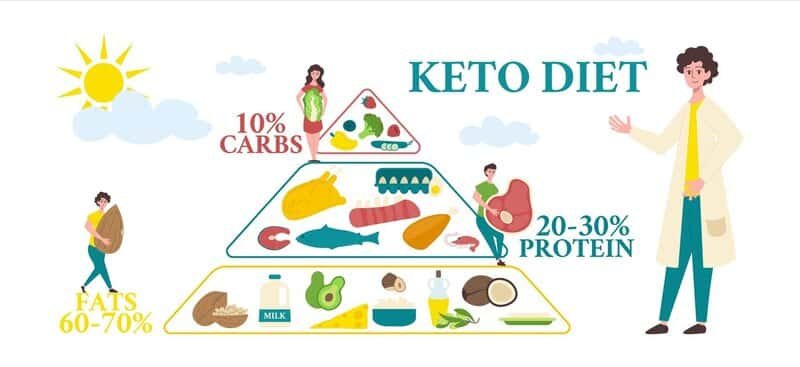In This Article
1. Introduction to the Keto Diet
The Keto Diet, or ketogenic diet is a dietary plan that significantly lowers carbohydrate intake while increasing fat consumption. Understanding this approach empowers you to push your body into a metabolic state known as ketosis. When in ketosis, your body becomes highly effective at burning fat for energy instead of relying on carbohydrates. This metabolic shift can lead to a decrease in body fat and improvements in several health metrics, giving you a sense of control over your health.
Explanation of the Keto Diet
The Keto Diet focuses on cutting down on carbs while upping fat intake. A typical macronutrient breakdown for this diet is about 70-75% fat, 20-25% protein, and just 5-10% carbohydrates. By restricting carbohydrates, the body is compelled to use fat as its main energy source. Foods commonly included in the diet are avocados, nuts, seeds, oils, fatty fish, and low-carb vegetables, while grains, sugars, and high-carb fruits are generally avoided.
Brief History and Popularity
The ketogenic diet originated in the early 20th century as a treatment for epilepsy, especially in children who didn’t respond well to traditional medications. It gained traction in the 1920s and 1930s but lost popularity when new anti-epileptic drugs were introduced.
Recently, the Keto Diet has experienced a resurgence as a popular strategy for weight loss, along with its potential benefits for improving metabolic health, managing diabetes, and enhancing mental clarity. The rise of social media, endorsements from celebrities, and an abundance of online resources have all fueled its widespread appeal. As more people share their success stories and experiences with the Keto Diet, interest continues to soar, making it a hot topic in the nutrition and wellness community.
2. Immediate Effects of the Keto Diet
When someone starts a ketogenic (keto) diet, they often notice several immediate effects that can greatly influence their body and overall health. Let’s examine these effects in greater detail:
- Weight Loss and Fat Burning: One of the most striking immediate results of the keto diet is rapid weight loss. This happens because of a substantial decrease in carbohydrate intake, which helps the body enter a metabolic state known as ketosis. In ketosis, the body transitions from using glucose (derived from carbs) as its main energy source to relying on fat instead. This process breaks down stored fat into ketones, which are then utilized for energy. Consequently, this not only helps with quick weight loss but also encourages fat reduction, particularly in those stubborn areas.
- Changes in Energy Levels: At first, some individuals might feel tired or sluggish while their bodies adjust to the lower carb intake, a phase often referred to as the “keto flu.” However, once the body gets accustomed to using fat as fuel, many people report experiencing a boost in energy levels. This transition can result in more stable energy throughout the day, avoiding the crashes frequently seen with high-carb diets. Additionally, many find they have improved endurance for physical activities as their bodies efficiently tap into fat reserves.
- Impact on Appetite and Cravings: The keto diet can significantly reduce hunger and cravings. This is partly because fats and proteins are more filling and tend to keep people satisfied for longer periods compared to carbohydrates. Also, the diet helps regulate insulin levels—leading to fewer spikes and crashes—which stabilizes appetite and lessens the frequency and intensity of cravings. As a result, many find they eat less naturally without feeling deprived, making it simpler to stick to their dietary objectives.
In conclusion, the immediate effects of the keto diet—such as weight loss, shifts in energy levels, and decreased appetite—can inspire a sense of accomplishment and motivate individuals to stay on their keto journey and discover its long-term advantages.
3. Long-Term Effects on the Body
- Metabolic changes over time: As time goes on, our bodies experience various metabolic shifts that influence how we process and use energy. Factors like age, level of physical activity, and dietary choices significantly contribute to these changes. For instance, metabolism typically slows down as we age, which may lead to weight gain if we don’t adjust our calorie intake accordingly. On the other hand, regular exercise can boost our metabolic rate, improving how efficiently our bodies use energy.
- Effects on muscle mass: Engaging in physical activity over the long term, particularly strength training, can have a profound effect on muscle mass. Consistent resistance training encourages muscle hypertrophy, which is the growth in muscle size resulting from the expansion of muscle fibers. In contrast, leading a sedentary lifestyle can result in muscle atrophy, where muscle mass diminishes over time. This decrease in muscle can affect overall strength, balance, and functionality, making it crucial to maintain an active lifestyle to keep our muscles healthy.
- Nutritional deficiencies and health risks: Prolonged periods of inadequate nutrition can lead to a variety of deficiencies that harm overall health. For example, not getting enough vitamins and minerals can weaken the immune system, contribute to bone density loss, and elevate the risk of chronic conditions like osteoporosis and heart disease. It’s essential to follow a balanced diet that fulfils the body’s nutritional requirements to promote long-term health and reduce these risks. Regularly assessing and adjusting our dietary habits can help prevent deficiencies and enhance overall well-being.
4. Impact on Mental Health and Cognitive Function
The ketogenic diet, commonly known as keto, has gained popularity not just for helping with weight loss but also for its possible effects on mental health and brain function.
- Effects on Mood and Anxiety: Studies indicate that the keto diet might help stabilize mood and lower anxiety levels. This could be linked to how the diet affects the balance of key neurotransmitters like serotonin and dopamine, which are essential for regulating mood. Additionally, by cutting back on carbohydrates, there may be fewer fluctuations in blood sugar levels, which can lead to mood swings. Many people report experiencing increased mental clarity and emotional stability while following a keto diet.
- Cognitive Benefits and Drawbacks: Some research connects the keto diet to improved cognitive performance, especially for individuals dealing with neurological conditions such as epilepsy, Alzheimer’s, and Parkinson’s disease. The brain can efficiently use ketones, which come from fats, as an energy source, potentially leading to better focus and mental performance. However, it’s worth noting that there can be some initial drawbacks, like the “keto flu.” This temporary condition may bring about fatigue, irritability, and brain fog as the body adjusts to a low-carb diet. During this transition, cognitive function might be affected until the body becomes accustomed to using ketones for energy.
In summary, while the keto diet may provide various mental health benefits, individual experiences will differ. It’s crucial to take personal health conditions into account and seek advice from a healthcare professional when considering dietary changes.
5. Potential Health Risks
When we think about how our lifestyle choices and eating habits affect our well-being, it’s important to recognize their impact on heart health and cholesterol levels, as well as liver and kidney function.
Heart Health and Cholesterol Levels
Keeping our hearts healthy is essential for overall wellness. High cholesterol levels can lead to a condition called atherosclerosis, where arteries get clogged with fatty deposits, raising the chances of heart disease and stroke. We typically talk about two main types of cholesterol: LDL (low-density lipoprotein), often labelled as “bad” cholesterol, and HDL (high-density lipoprotein), known as “good” cholesterol. Eating a lot of saturated fats, trans fats, and cholesterol can increase LDL levels while staying active and consuming healthy fats (like those found in fish and nuts) can help boost HDL levels. Regular check-ups with healthcare professionals can keep track of cholesterol levels and heart health, helping to guide any necessary lifestyle changes.
Liver and Kidney Function
The liver and kidneys are crucial organs that filter toxins, process nutrients, and regulate many bodily functions. Poor lifestyle choices, like drinking too much alcohol or consuming a high-sugar diet, can harm the liver, leading to issues like fatty liver disease or cirrhosis. Likewise, conditions such as diabetes and high blood pressure can negatively impact kidney function, potentially leading to chronic kidney disease. Staying hydrated, eating a balanced diet, and avoiding excessive consumption of harmful substances are vital for maintaining liver and kidney health. Regular medical check-ups can help identify any early warning signs of dysfunction, allowing for prompt intervention.
In summary, being aware of these potential health risks and taking proactive measures to address them can greatly improve our overall health and longevity.
6. Success Stories and Case Studies
In this section, we will explore real-life stories of individuals who have embraced the ketogenic diet for an extended period. By sharing their experiences, we can showcase the variety of journeys long-term Keto dieters go through, highlighting not just their achievements but also the obstacles they faced along the way.
- Examples of Long-Term Keto Dieters: We will present a range of case studies featuring people from diverse backgrounds, ages, and lifestyles who have chosen the Keto diet. Each narrative will detail their reasons for starting the diet, the changes they made to their eating habits, and how they’ve successfully maintained their Keto lifestyle over time. These stories will offer valuable insights into the practicalities of sticking to the diet in everyday life.
- Health Improvements and Challenges Faced: Alongside each success story, we will look into the health benefits these individuals experienced, such as weight loss, increased energy, enhanced mental clarity, and better overall health markers. Nonetheless, it’s equally crucial to discuss the challenges they encountered, including navigating social situations, managing cravings, and dealing with potential side effects like the “Keto flu.” By highlighting both the positive results and the difficulties, we aim to provide a well-rounded view of what it truly means to be a long-term Keto dieter, offering both inspiration and realistic expectations for anyone thinking about adopting this lifestyle.
Conclusion
In this section, we’ll summarize the main takeaways about the Keto Diet and offer some tips for anyone thinking about sticking with it long-term.
Summary of Findings
The Keto Diet, which is high in fats, moderate in proteins, and extremely low in carbohydrates, has been shown to help many people lose weight and improve certain health markers. Research suggests it can be beneficial for managing conditions like epilepsy, type 2 diabetes, and metabolic syndrome. Some studies even indicate that this diet may boost mental clarity and energy levels as the body learns to use fat for fuel instead of carbs. However, it’s important to recognize that the Keto Diet might not work for everyone and can have some side effects, such as nutrient deficiencies, digestive issues, and what’s often commonly known as the “keto flu” during the initial adjustment period.
Recommendations for Long-Term Consideration
If you’re considering sticking with the Keto Diet for the long haul, here are some important factors to keep in mind:
- Consult a Healthcare Professional: Before starting or continuing with the Keto Diet, it’s essential to talk to a healthcare provider, especially if you have any existing health issues or concerns. A professional can help customize the diet to fit your needs and keep an eye on any health effects.
- Focus on Nutrient-Dense Foods: Make it a priority to eat whole, nutrient-rich foods like avocados, nuts, seeds, leafy greens, and high-quality proteins. This focus can help prevent potential deficiencies and support your overall health.
- Stay Hydrated and Monitor Electrolytes: The Keto Diet can lead to increased water loss and shifts in electrolyte levels, so staying hydrated is crucial. Consider adding electrolyte supplements if necessary.
- Plan for Sustainability: Think about how the Keto Diet can fit into your long-term lifestyle. Incorporating occasional higher-carb days, known as carb cycling, can help maintain metabolic flexibility and improve adherence to the diet.
- Listen to Your Body: Everyone reacts differently to the Keto Diet. It’s vital to pay attention to how your body responds and make changes as needed. If you experience ongoing negative symptoms, it may be a good idea to reassess your approach to the diet.
By following these recommendations, you can better navigate the challenges of the Keto Diet and make informed choices about your health and wellness journey.

Clara
Dr. Clara is a dedicated physician and fitness expert specializing in preventative medicine and lifestyle management. With a medical degree from University of California San Francisco and certifications in personal training and nutrition, she provides holistic, personalized care. Dr. Clara is passionate about empowering individuals to achieve their health and fitness goals through balanced, sustainable practices.







